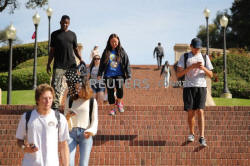How college students can find jobs - without much work
experience
 Send a link to a friend
Send a link to a friend
 [April 09, 2019]
By Chris Taylor [April 09, 2019]
By Chris Taylor
NEW YORK (Reuters) - When college student
Danny Franklin started thinking about jobs after graduation, his
expectations were not very high.
The 21-year-old accounting major at Delaware State had the typical work
experience of many young Americans: Not a whole lot.
Franklin's job history included stints at McDonald’s, Sears, and Sam’s
Club – but nothing that would really grab the attention of a big
accounting firm.
No wonder Franklin's LinkedIn page did not generate any job leads. Then
his adviser in junior year told him about Handshake (joinhandshake.com),
a jobs community for college kids and young alumni.
After a month or two of building his Handshake profile, he was taken
aback: Companies were starting to contact him, instead of the other way
around.

“I was very surprised and overwhelmed,” says Franklin. “Companies were
telling me about internships, professional development events and
inviting me to apply to all these things.”
Among the big-name firms that got in touch were consumer products giant
Procter & Gamble, and a couple of the nation’s largest accounting
concerns, Deloitte and PwC.
Franklin ended up accepting a position with prominent investment
managers Capital Group, in its Norfolk, Virginia. offices. He is slated
to start a full-time position there in the fall, after his graduation
this spring.
CULTIVATING EXPERIENCE
Franklin managed to solve a tricky puzzle young grads encounter when
entering the workforce. How do you get that first job in your chosen
field, when you do not have any experience yet?
“LinkedIn is more of a mid-career tool, when you already have work
experience and your professional network is established,” says Garrett
Lord, Handshake’s CEO and co-founder. “But many students don’t have that
work experience yet and may not even know what they want. That’s where
Handshake shines.”
After all, it is not easy for young adults to get on that first rung of
the corporate ladder, even in a hot economy. In fact, 41.4 percent of
recent grads are considered “underemployed,” or working in a lower-level
gig that did not require a degree, according to a study by the Federal
Reserve Bank of New York.
[to top of second column] |

University of California
Los Angeles (UCLA) students walk on the UCLA campus in Los Angeles,
California, U.S. November 15, 2017. REUTERS/Lucy Nicholson
It is an easier leap to make for students at big-name universities –
like, say, Harvard or Yale – since Fortune 500 companies will physically
come to their campuses and job fairs and actively recruit. But for
students at smaller colleges that may not be on recruiters’ radars, like
Danny Franklin at Delaware State, how are they supposed to get started
in life?
It was a familiar problem for Garrett Lord, himself a graduate of Michigan Tech,
which was not exactly the first stop on the trail for Google or Apple
recruiters. That is why he and his co-founders started Handshake, to create
something akin to LinkedIn, but focused on college kids and young grads across
the country and not just those in the Ivy League.
Handshake’s numbers so far are impressive: 14 million college students and young
alumni, more than 700 colleges in its network, 900,000 recruiters – and,
notably, 100 percent of the Fortune 500.
It has obviously caught the attention of significant Silicon Valley movers, with
backers like the Chan Zuckerberg Initiative (yes, that Zuckerberg), the Omidyar
Network (that’s Pierre Omidyar, founder of eBay), venture capital firm Kleiner
Perkins, and more.
It is certainly a sea change from the college jobs offices of yore. Those of us
of a certain age remember dusty and disorganized operations, with harried
supervisors, cluttered desks and index cards of random job offers tacked up on
corkboards.
By and large, job-hunting at colleges does not work like that anymore. In fact,
Handshake has partnered with 70 percent of the top 500 universities in the
country, matching them with 350,000 companies trying to fill slots.

Of course, students do not necessarily need to choose between career apps. They
can leverage all of them and boost their odds of getting HR managers' attention.
When Danny Franklin racked up an impressive 3.5 GPA, joined his school’s
accounting club and put in some volunteer work with Habitat for Humanity, he
uploaded it all – and, apparently, it paid off.
“Without that profile, I would probably still be applying for jobs.”
(Editing by Lauren Young and Dan Grebler)
[© 2019 Thomson Reuters. All rights
reserved.] Copyright 2019 Reuters. All rights reserved. This material may not be published,
broadcast, rewritten or redistributed.
Thompson Reuters is solely responsible for this content. |